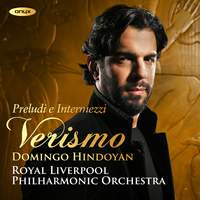Recording of the Week,
Verismo from Domingo Hindoyan and the Royal Liverpool Philharmonic Orchestra
One of the lovely aspects of the album is how Hindoyan has balanced familiar extracts with much-rarer pieces, so I dare suggest that even for seasoned aficionados of the genre there might well be one or two discoveries along the way. In the former camp comes the album's opener, the famous 'Dance of the Hours' from Ponchielli's La Gioconda. It's an inspired choice to kick things off as it reminds us that verismo needn't necessarily be doom and gloom 100% of the time, and showcases some exquisitely delicate playing from the woodwind and harp especially.
Even with something as well-known as the Intermezzo from Mascagni's Cavalleria rusticana, it's a joy how Hindoyan makes it sound fresh simply by following the markings in the score: we are so often used to hearing the "big tune" played at full intensity from the get-go that it is easy to forget that the strings here are actually initially marked pianissimo with a gradual crescendo. Observing this not only allows the organ and harp to register without having to fight to be audible, but also makes the con forza climax all the more impactful when the strings are finally let off the leash.
It wouldn't be quite right to feature some Cav without any Pag, and so it's fitting to have the Intermezzo from Leoncavallo's Pagliacci, which again allows the Liverpool strings to soar most affectingly, as indeed they do in another Intermezzo from Cilea's Adriana Lecouvreur.
While there is plenty of drama and raw emotion on offer, what makes the album so satisfying is the way that Hindoyan prevents it from being wearisome by switching the mood completely: I've already mentioned the graceful delights of the Ponchielli extract, and similarly, just as you might start to feel you have had about as much angst-ridden fervour as you can manage, along comes the fizz and sparkle of a piece such as the Overture to Ermanno Wolf-Ferrari's Il segreto di Susanna, or the upbeat energy of the Sinfonia from Mascagni's Le maschere, to cleanse the palate and raise the spirits.
Running through the album are passages from several Puccini operas, including heartbreaking excerpts from Manon Lescaut and Suor Angelica. His more obscure output is represented too, notably with the Prelude to Act Three of Edgar: a stirring funeral procession carrying a suit of armour that the crowd (mistakenly) believes to contain the body of Edgar. For such an early work it's fascinating to hear how it already contains many of the hallmarks of the more mature Puccini's style, and Hindoyan and his players successfully wring every last drop of feeling from the piece.
The album closes with more Puccini: the orchestral interlude before the final scene of Madama Butterfly. In a way it is the perfect choice to conclude proceedings, as it neatly encapsulates the changing temperaments of verismo, from the incandescent tragedy of the opening phrases, to the more reflective pathos of the bulk of the piece, and finally the morning light of dawn with (literal) bird calls. It's perhaps a bold move to end an album of extreme passion and turbulence on such a fragile note, and yet it works beautifully, with the violins gently fading away on a contemplative note of relative calm.
Royal Liverpool Philharmonic Orchestra, Domingo Hindoyan
Available Formats: CD, MP3, FLAC, Hi-Res FLAC




